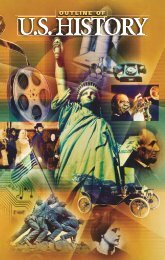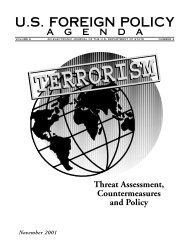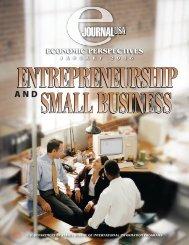Working for Women Worldwide - Embassy of the United States
Working for Women Worldwide - Embassy of the United States
Working for Women Worldwide - Embassy of the United States
Create successful ePaper yourself
Turn your PDF publications into a flip-book with our unique Google optimized e-Paper software.
has been a positive shift in international understanding<br />
<strong>of</strong> <strong>the</strong> impact <strong>of</strong> armed conflict on women and girls<br />
and <strong>the</strong> importance <strong>of</strong> women’s participation as equal<br />
partners in all areas related to peace and society.” The<br />
report takes note <strong>of</strong> “significant strides” in some countries,<br />
such as Colombia, where a President’s Advisory<br />
Office on Gender Equality helped set up a working<br />
group to support women’s participation in promoting<br />
peace in that nation.<br />
Dramatic Progress in Iraq<br />
and Afghanistan<br />
Progress has been especially dramatic in<br />
Afghanistan (see story on page 48) and Iraq, where<br />
U.S. support has enabled women to play vital roles in<br />
<strong>for</strong>ging <strong>the</strong> new governments. In Iraq, 25 <strong>of</strong> <strong>the</strong> 100<br />
members elected to <strong>the</strong> Iraqi National Council are<br />
women, as are six ministers and seven deputy ministers<br />
<strong>of</strong> <strong>the</strong> current Iraqi cabinet.<br />
In March 2004, <strong>the</strong>n Secretary <strong>of</strong> State Colin<br />
Powell announced a $10-million Iraqi <strong>Women</strong>’s<br />
Democracy Initiative to train Iraqi women in <strong>the</strong> fundamentals<br />
<strong>of</strong> democracy. The Art <strong>of</strong> Living Foundation,<br />
created by a young Iraqi woman who traveled<br />
across <strong>the</strong> desert to Baghdad to conduct stress management<br />
classes during <strong>the</strong> early days <strong>of</strong> military intervention<br />
<strong>the</strong>re, is using its U.S. grant <strong>for</strong> a program<br />
focusing on <strong>the</strong> mental health needs <strong>of</strong> Iraqi women<br />
while training <strong>the</strong>m <strong>for</strong> jobs.<br />
<strong>Women</strong> representing U.S. organizations, companies,<br />
and universities are eager to assist women in Iraq,<br />
as well. The Society <strong>for</strong> <strong>Women</strong> Engineers, <strong>for</strong> example,<br />
is working to create a similar organization in Iraq,<br />
and U.S. women working in radio and television are<br />
gearing up to train Iraqi women media specialists.<br />
Since 2002, <strong>the</strong> U.S. Congress has earmarked<br />
$27 million <strong>for</strong> programs targeted to women in Iraq<br />
and <strong>the</strong> <strong>United</strong> <strong>States</strong> has funded more than 200 projects<br />
to benefit Afghan women and girls. New<br />
<strong>Women</strong>’s Centers in each country—17 throughout<br />
Afghanistan and 20 in Iraq—provide sanctuary from<br />
violence and <strong>of</strong>fer women basic education, health care,<br />
and job skills. The Mansour <strong>Women</strong>’s Opportunity<br />
Center in Baghdad, <strong>for</strong> example, provides vocational<br />
training to women and girls, particularly widows and<br />
victims <strong>of</strong> rape, torture, and trafficking, and will soon<br />
provide microcredit loans to help women start homebased<br />
businesses.<br />
In Afghanistan, <strong>the</strong>re have been many successes<br />
since 2002, when President Bush and now Afghan<br />
President Hamid Karzai first created <strong>the</strong> U.S.-<br />
Afghan <strong>Women</strong>’s Council. These include training <strong>for</strong><br />
teachers and midwives and projects backed by U.S.<br />
corporations and foundations to train women judges<br />
and journalists and to create community banks that<br />
can issue small loans to Afghan women.<br />
Ano<strong>the</strong>r important State Department initiative,<br />
called <strong>Women</strong> Leading <strong>Women</strong> in Peace: Fostering<br />
Courage <strong>for</strong> Change, promotes exchanges between<br />
businesswomen from leading companies in <strong>the</strong> <strong>United</strong><br />
<strong>States</strong> and women trying to rebuild <strong>the</strong>ir post-conflict<br />
societies. The department hopes to extend <strong>the</strong> womenhelping-women<br />
network so that women in countries<br />
such as Kosovo, who have polished <strong>the</strong>ir leadership<br />
skills and effected positive change, can share <strong>the</strong>ir<br />
experiences and advice with <strong>the</strong>ir sisters in o<strong>the</strong>r parts<br />
<strong>of</strong> <strong>the</strong> world.<br />
Under Secretary <strong>of</strong> State <strong>for</strong> Global Affairs Paula<br />
Dobriansky launched this initiative in cooperation<br />
with <strong>the</strong> Fortune 500 Most Powerful <strong>Women</strong> in<br />
Business Conference. The initiative started in<br />
Afghanistan, but soon it will move to <strong>the</strong> Balkans,<br />
Burundi, Cambodia, Colombia, and <strong>the</strong> Democratic<br />
Republic <strong>of</strong> <strong>the</strong> Congo.<br />
Recalling a recent meeting with a delegation <strong>of</strong><br />
women from Sudan, <strong>the</strong> State Department’s Ponticelli<br />
speaks eloquently about <strong>the</strong> strength and determination<br />
<strong>of</strong> women who have survived <strong>the</strong> horrors <strong>of</strong> war<br />
and <strong>the</strong>ir potential <strong>for</strong> waging peace. She said: “They<br />
have survived indescribable nightmares, yet <strong>the</strong>y are<br />
anything but helpless victims. They are looking <strong>for</strong>ward.<br />
They want a say in running <strong>the</strong> refugee camps,<br />
<strong>the</strong>y want a place at <strong>the</strong> negotiating table, <strong>the</strong>y want<br />
leadership positions, and <strong>the</strong>y feel united even though<br />
<strong>the</strong>y are from different parts <strong>of</strong> Sudan. They said, ‘We<br />
all speak one language—we want peace; we all want a<br />
better future <strong>for</strong> our children.’”<br />
No doubt <strong>the</strong>y speak <strong>for</strong> women in conflict situations<br />
throughout <strong>the</strong> world.<br />
For additional in<strong>for</strong>mation on this issue, please<br />
see: http://www.state.gov/g/prm/, http://www.state.<br />
gov/g/wi/, and http://www.usaid.gov/.<br />
46












